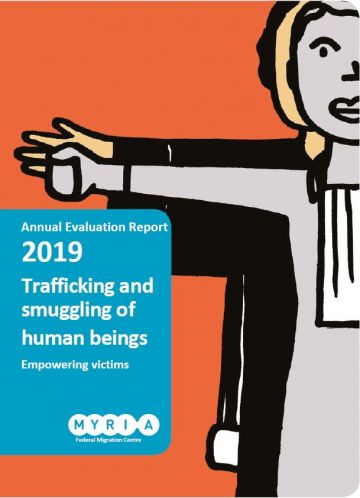2019 Annual report trafficking and smuggling of human beings
Empowering victims
As Independent National Rapporteur on the trafficking of human beings, Myria is publishing its public and independent annual report in English, issued in November 2019. This report analyses the evolution and the results of the fight against trafficking and smuggling of human beings. Addressed to the Government and Parliament, it provides impetus and offers support to players in the field. Entitled Empowering victims, the 2019 report focuses on information for victims of human trafficking and legal aid.
At the beginning of the 1990s, Belgium was a pioneer in the fight against human trafficking. Almost thirty years later, it has come to Myria's attention that the fight against trafficking in human beings is no longer on the political agenda in practice. And the victims are suffering. There are still major difficulties in the field in terms of detecting, informing and protecting victims.
Justice for victims still has a long way to go. With its annual report, Myria wants to contribute to their empowerment and has put together concrete recommendations for the attention of public authorities.
Content
Part 1: Myria in action (point 1-5 only available in French)
Part 2: Focus: Victims' right to legal aid and protection
Part 3: Evolutions and fight against the phenomena of trafficking and smuggling of human beings
Victims require specific attention. To this end, police and inspection services, as well as the judiciary, need adequate human and material resources, which are currently lacking. The specialised victim reception centres have also been struggling in vain for years to obtain structural funding. In 2021, the Council of Europe will assess Belgium on access to justice and measures for the effective reparation of victims.
Victims benefit from specific rights, such as being informed of assistance and support measures in a language that is simple and accessible. This obligation applies to such frontline services as the police and inspection services. These services play a key role in detecting victims and offering them the assistance of a specialised reception centre. The information provided initially is therefore crucial.
In practice, detecting and informing victims during checks proves to be productive in some cases, but very problematic in many others. When trafficking victims fail to be detected, they run the risk, as third-country nationals, of being placed in a detention centre in order to be repatriated. Myria therefore recommends pursuing and intensifying training efforts among those services in contact with potential victims.
Quickly offer victims of trafficking the assistance of a lawyer
The quick appointment of a lawyer enables victims to be properly represented during proceedings and their interests to be better defended (e.g. if the case is dropped, the perpetrator's lawyer requests a confrontation, or if the victims wish to return quickly to their country of origin). Victims can thus decide, in full knowledge of the facts, whether or not to file a civil suit to request access to the file and, if necessary, additional investigative measures.
In addition, they should benefit from free legal assistance until the end of the proceedings. Just like other categories of litigants, these are vulnerable people. Myria therefore recommends adapting the Royal Decree of 18 December 2003 on secondary legal aid in order to allow trafficking victims, whose status was recognised, to benefit from this aid until after the criminal proceedings. Investigations into human trafficking take time. It may take several years for a case to be closed. In such cases, it is likely that the victim has found a job and no longer meets the conditions for legal aid to benefit from a pro-bono lawyer.
Victims of trafficking who wish to obtain compensation must file a civil suit to claim damages. A conviction coupled with compensation can increase victims' confidence in the judicial system and reduce the risk of being re-trafficked. The case law analysis shows that victims are sometimes awarded a considerable amount of compensation. However, there are many obstacles to effectively obtaining it. Hence, the actual payment of the damages awarded will depend on the perpetrator's solvency. Myria therefore encourages awarding the confiscated sums to the civil party as compensation.
Furthermore, to be eligible for assistance from the Commission for Financial Aid to Victims of Deliberate Acts of Violence, trafficking victims must have been the subject of a deliberate act of violence – among other conditions – and "have suffered serious physical or psychological harm as a result". Victims of trafficking for the purpose of labour exploitation suffer an insidious form of violence which, as such, doesn't amount to a deliberate act of violence, as interpreted by the Commission. Myria therefore urges the Commission to show some openness in the interpretation of the notion of "deliberate act of violence" for victims of trafficking for the purpose of labour exploitation, and to even consider a legislative amendment so that all victims of trafficking can obtain assistance from the Fund, regardless of the form of exploitation suffered.
As soon as traffickers suspect an investigation is under way, they often hide or move their assets, or allow their business to go bankrupt, so that effective compensation of victims is rarely possible. It is therefore essential to seize the criminal assets of suspects from the outset, by conducting a thorough financial investigation. This is the only way the court can award the confiscated money, when judgment is passed, as compensation to the victims who have filed a civil suit.

